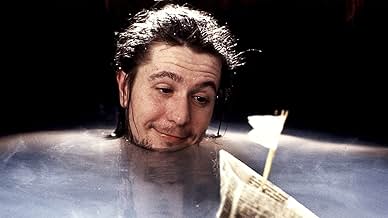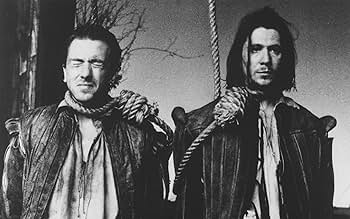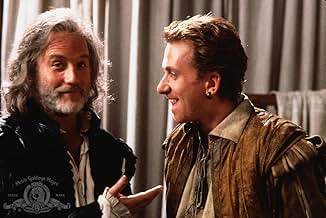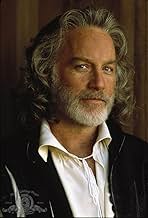Rosencrantz & Guildenstern sont morts
Titre original : Rosencrantz & Guildenstern Are Dead
- 1990
- Tous publics
- 1h 57min
NOTE IMDb
7,3/10
24 k
MA NOTE
Ajouter une intrigue dans votre langueTwo minor characters from the play 'Hamlet' stumble around unaware of their scripted lives and unable to deviate from them.Two minor characters from the play 'Hamlet' stumble around unaware of their scripted lives and unable to deviate from them.Two minor characters from the play 'Hamlet' stumble around unaware of their scripted lives and unable to deviate from them.
- Réalisation
- Scénario
- Casting principal
- Récompenses
- 3 victoires et 2 nominations au total
Serge Soric
- Tragedian
- (as Srdjan Soric)
Sven Medvesek
- Laertes
- (as Sven Medvesck)
Histoire
Le saviez-vous
- AnecdotesOriginally, the two leads (who appropriately spend the movie mixing up their own names) were cast the other way around.
- GaffesThroughout the movie there are scenes where day suddenly changes to night and vice versa. This is a running gag of Tom Stoppard plays which often have "time jumps" written into the stage directions.
- Citations
Rosencrantz: Do you think Death could possibly be a boat?
Guildenstern: No, no, no... Death is "not." Death isn't. Take my meaning? Death is the ultimate negative. Not-being. You can't not be on a boat.
Rosencrantz: I've frequently not been on boats.
Guildenstern: No, no... What you've been is not on boats.
- ConnexionsEdited into Spisok korabley (2008)
Commentaire à la une
This film is one of the most glorious and intriguing examples of modern cinematic art I have ever encountered. I am not going to run you through the entire movie, as that has been done several times on here already, but I would like to clear up a few misunderstandings and harsh words that I have read in previous comments.
First and foremost, I have not seen or read the play (although I am looking forward to it) and I was perfectly able to understand all of the so-called "high-brow" concepts like fate, time, freewill, self-awareness, and the light peppering of existential musings (my favorite of which is the "...well at least I'm not dead." speech). The first time I watched this film I was very fascinated, amused, and slightly confused. These Pythoneon nonsensical scenes that some of you are reffering to were a bit difficult to understand, but after a second viewing they all made perfect sense. It does not take a genius to see the multiple layers and metaphors being used in this film. As for being totally lost without first seeing the play, that is rediculous. It took a bit of thinking and rewinding, but it is comprehensible, and after you figure it all out for yourself it is very rewarding and adds to the enjoyment, and genius, of the film. For example, the first time i watched this movie I was very confused by the pages of manuscript randomly floating around after R&G encounter the players for the first time. But once you realize that the lead player is fully self-aware, has been through these scenarios (the play "Hamlet") several times with a full consciousness and memory of the events (demonstrated rather obviously by his full knowledge of future events, the play that his troupe rehearses in front of R&G wich is an exact copy of "Hamlet", etc.) it makes for a wonderful metaphor demonstrating what has happened to the original play (Hamlet) now that some of its more flat characters are starting to think outside the script, so to speak, and become a bit more round.
Well, I could go on forever about this masterpiece, and maybe I will at a later date, but for now I just wanted you know that this film is anything but simple. If you can manage to put a little thought into what you are seeing and hearing you will find that it is perhaps the most complex, multi-layered, intuitively rewarding film ever created.
P.S. I am afraid this film is not widely accessible to the majority of movie watchers, which really saddens me because it is truly an amazing work of art. I would very much like to remedy this. So, if you have watched this movie at least 2 times, and are still puzzled by some of the scenes, please feel free to email me and I would be happy to explain anything that might heighten your understanding of the film.
First and foremost, I have not seen or read the play (although I am looking forward to it) and I was perfectly able to understand all of the so-called "high-brow" concepts like fate, time, freewill, self-awareness, and the light peppering of existential musings (my favorite of which is the "...well at least I'm not dead." speech). The first time I watched this film I was very fascinated, amused, and slightly confused. These Pythoneon nonsensical scenes that some of you are reffering to were a bit difficult to understand, but after a second viewing they all made perfect sense. It does not take a genius to see the multiple layers and metaphors being used in this film. As for being totally lost without first seeing the play, that is rediculous. It took a bit of thinking and rewinding, but it is comprehensible, and after you figure it all out for yourself it is very rewarding and adds to the enjoyment, and genius, of the film. For example, the first time i watched this movie I was very confused by the pages of manuscript randomly floating around after R&G encounter the players for the first time. But once you realize that the lead player is fully self-aware, has been through these scenarios (the play "Hamlet") several times with a full consciousness and memory of the events (demonstrated rather obviously by his full knowledge of future events, the play that his troupe rehearses in front of R&G wich is an exact copy of "Hamlet", etc.) it makes for a wonderful metaphor demonstrating what has happened to the original play (Hamlet) now that some of its more flat characters are starting to think outside the script, so to speak, and become a bit more round.
Well, I could go on forever about this masterpiece, and maybe I will at a later date, but for now I just wanted you know that this film is anything but simple. If you can manage to put a little thought into what you are seeing and hearing you will find that it is perhaps the most complex, multi-layered, intuitively rewarding film ever created.
P.S. I am afraid this film is not widely accessible to the majority of movie watchers, which really saddens me because it is truly an amazing work of art. I would very much like to remedy this. So, if you have watched this movie at least 2 times, and are still puzzled by some of the scenes, please feel free to email me and I would be happy to explain anything that might heighten your understanding of the film.
- destronjin
- 3 juin 2002
- Permalien
Meilleurs choix
Connectez-vous pour évaluer et suivre la liste de favoris afin de recevoir des recommandations personnalisées
- How long is Rosencrantz & Guildenstern Are Dead?Alimenté par Alexa
Détails
- Date de sortie
- Pays d’origine
- Langue
- Aussi connu sous le nom de
- Rosencrantz et Guildenstern sont morts
- Lieux de tournage
- Sociétés de production
- Voir plus de crédits d'entreprise sur IMDbPro
Box-office
- Montant brut aux États-Unis et au Canada
- 739 104 $US
- Week-end de sortie aux États-Unis et au Canada
- 24 004 $US
- 10 févr. 1991
- Montant brut mondial
- 739 104 $US
- Durée1 heure 57 minutes
- Couleur
- Rapport de forme
- 1.85 : 1
Contribuer à cette page
Suggérer une modification ou ajouter du contenu manquant

Lacune principale
By what name was Rosencrantz & Guildenstern sont morts (1990) officially released in India in English?
Répondre

























